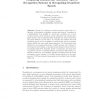Free Online Productivity Tools
i2Speak
i2Symbol
i2OCR
iTex2Img
iWeb2Print
iWeb2Shot
i2Type
iPdf2Split
iPdf2Merge
i2Bopomofo
i2Arabic
i2Style
i2Image
i2PDF
iLatex2Rtf
Sci2ools
AI
2011
Springer
2011
Springer
Comparing Humans and Automatic Speech Recognition Systems in Recognizing Dysarthric Speech
Abstract. Speech is a complex process that requires control and coordination of articulation, breathing, voicing, and prosody. Dysarthria is a manifestation of an inability to control and coordinate one or more of these aspects, which results in poorly articulated and hardly intelligible speech. Hence individuals with dysarthria are rarely understood by human listeners. In this paper, we compare and evaluate how well dysarthric speech can be recognized by an automatic speech recognition system (ASR) and na¨ıve adult human listeners. The results show that despite the encouraging performance of ASR systems, and contrary to the claims in other studies, on average human listeners perform better in recognizing single-word dysarthric speech. In particular, the mean word recognition accuracy of speaker-adapted monophone ASR systems on stimuli produced by six dysarthric speakers is 68.39% while the mean percentage correct response of 14 na¨ıve human listeners on the same speech is 79.78% a...
AI 2011 | Artificial Intelligence | Automatic Speech Recognition | Speech Recognition System | Word Recognition Accuracy |
| Added | 24 Aug 2011 |
| Updated | 24 Aug 2011 |
| Type | Journal |
| Year | 2011 |
| Where | AI |
| Authors | Kinfe Tadesse Mengistu, Frank Rudzicz |
Comments (0)

